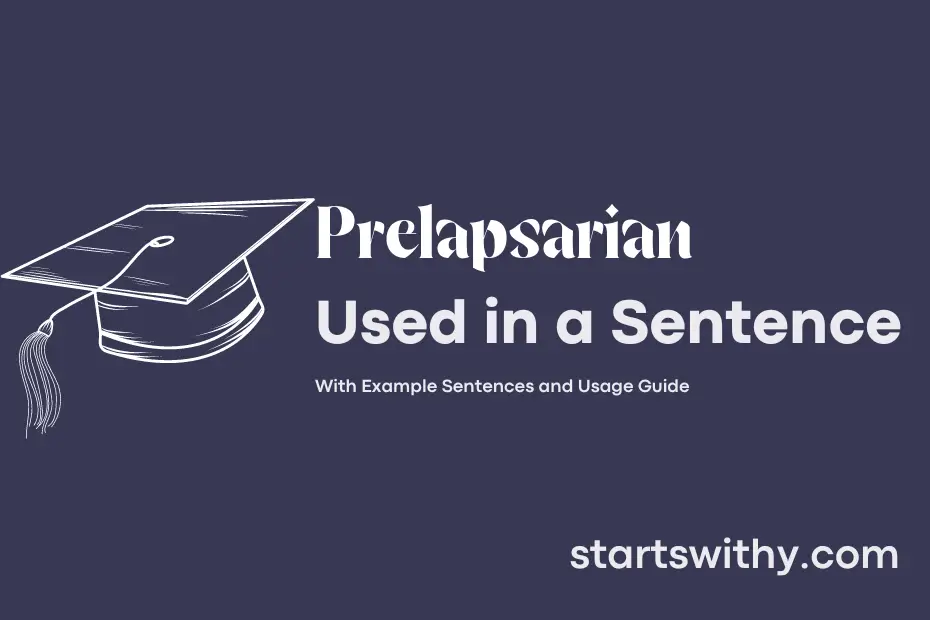Have you ever encountered a term that made you pause and ponder its meaning? Enter the intriguing notion of “prelapsarian,” a word steeped in religious and philosophical connotations. Derived from the Latin words “prae” meaning “before” and “lapsus” meaning “fall,” prelapsarian refers to a state or condition before the occurrence of a significant downfall or negative event.
In simpler terms, prelapsarian signifies a time or situation of innocence, purity, or bliss before any corruption or wrongdoing occurred. This term is often used in discussions about theology, literature, and even human history to refer to an idealized period untainted by sin or imperfection.
7 Examples Of Prelapsarian Used In a Sentence For Kids
- Prelapsarian means the time before Adam and Eve sinned.
- In the prelapsarian world, animals were peaceful and friendly.
- Let’s imagine a beautiful prelapsarian garden with lush green trees.
- Birds flew freely and happily in the prelapsarian era.
- Garden of Eden is often described as a lovely prelapsarian paradise.
- The serpent’s temptation led to the end of prelapsarian innocence.
- We can learn about the prelapsarian period from reading religious texts.
14 Sentences with Prelapsarian Examples
- Prelapsarian days were characterized by simplicity and purity.
- Many students long for a return to a more prelapsarian state of mind.
- The campus garden provides a tranquil space reminiscent of a prelapsarian paradise.
- The college library is often seen as a haven of prelapsarian quiet and concentration.
- Before the stress of exams and assignments, students may feel like they are in a prelapsarian bubble.
- The early morning hours on campus can feel almost prelapsarian in their peacefulness.
- Some students find solace in practicing yoga, aiming to achieve a sense of prelapsarian calm.
- Taking a break from technology can help bring back a more prelapsarian way of living.
- Studying under a shady tree can transport students to a more prelapsarian setting.
- Engaging in mindfulness practices can help students tap into their prelapsarian state of being.
- The nostalgic feeling of a prelapsarian existence can be elicited through certain works of literature.
- Away from the hustle and bustle of the city, students may seek out prelapsarian environments.
- In moments of reflection, students may yearn for the simplicity of a prelapsarian era.
- The college campus during the holidays can feel almost prelapsarian in its deserted state.
How To Use Prelapsarian in Sentences?
To Prelapsarian is to use the word in a sentence, simply follow these steps:
-
Identify the context: Before using the word Prelapsarian, understand its meaning. Prelapsarian is an adjective that refers to the time or state before the Fall of Man or the Christian doctrine of the original sin of Adam and Eve.
-
Construct your sentence: Once you have a clear understanding of the meaning of Prelapsarian, think about how you can incorporate it into a sentence. For example, “The artist’s painting depicted an idyllic Prelapsarian garden untouched by sin.”
-
Practice using it correctly: Try saying your sentence out loud to ensure that it flows well and makes sense in the context you are using it. It might also be helpful to write a few more sentences using the word Prelapsarian to reinforce your understanding of its meaning.
-
Be mindful of the context: Since Prelapsarian has a specific religious connotation, make sure to use it appropriately in discussions related to theology, literature, or art that deal with the concept of the Fall of Man.
-
Get feedback: If you’re unsure if you’ve used Prelapsarian correctly, ask for feedback from a teacher, friend, or language partner. This will help you improve your sentence construction skills and mastery of using new vocabulary.
Conclusion
In summary, understanding the concept of prelapsarian, which refers to a state of innocence or bliss before the Fall of Man, is crucial in various literary and religious contexts. Through sentences with prelapsarian, we can explore themes of purity, harmony, and idyllic perfection often associated with this pristine state. These sentences serve as windows into mythical and theological narratives that depict a world untouched by sin or corruption.
By analyzing sentences with prelapsarian, we gain insights into the contrasting dichotomy between the prelapsarian and postlapsarian worlds, shedding light on the consequences of human disobedience and the loss of paradise. Through such linguistic expressions, we can appreciate the nuanced representations of innocence and perfection that shape our understanding of morality and the human condition.



